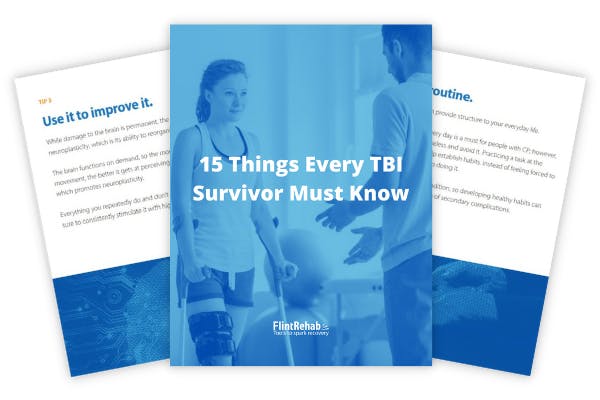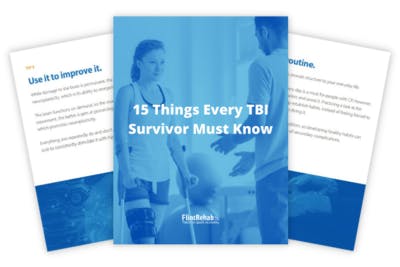No products in the cart.
No products in the cart.
No products in the cart.
No products in the cart.
Home » Neurological Recovery Blog » Traumatic Brain Injury » How Nutrition Therapy for Traumatic Brain Injury Can Help the Brain Heal
Last updated on October 15, 2020

Nutrition therapy plays a huge role in overcoming the effects of traumatic brain injury. In fact, a good nutritional therapy regimen can actually help boost cognitive performance.
In this article, we will explain what nutrition therapy for traumatic brain injury entails and how to best use it.
Nutritional therapy is an intervention that seeks to mitigate the negative outcomes of secondary brain damage. This term refers to damage that occurs after or as a result of the initial TBI.
For example, a brain injury can alter the balance of ions and chemicals in your brain. This imbalance causes the production of free radicals (unstable molecules) that inflame brain tissue and cause decreased blood flow and further destruction of neurons.
In response to this damage, the brain demands extra energy to heal itself and reduce the inflammation. However, it can no longer effectively use the energy it normally gets. This is where nutrition therapy comes in.
A proper nutritional therapy program can supply your brain with the extra amounts of the nutrients it has lost and in turn promote healing.

Nutrition therapy often begins in the hospital, through IV nutrition. Doctors will administer vital nutrients that not only prevent further brain damage but also preserve muscle mass and organ function. Ideally, this treatment will begin within 24 hours after a traumatic brain injury.
As the patient recovers, they may no longer require IV nutrition. However, although they may not need an IV, it is critical to continue to address their nutritional deficits either through supplements or a specialized diet plan. A nutritional therapist can offer valuable advice on which nutrients you require and how to best access them.
If the person has retained their swallowing abilities, they can meet their nutritional requirements through an individualized diet. To craft an effective nutrition therapy program for traumatic brain injury patients, it will help to know which nutrients the brain demands after a TBI.
The following are a few essential nutrients that promote recovery from brain injury:
If, on the other hand, the patient cannot consume solid food, there are many vitamins and supplements for brain injury patients that can help them receive these nutrients.
Now that you understand which nutrients are needed to help your brain heal, it’s time to look at a specific diet that can be beneficial for brain injury.

One of the stranger effects of TBI is the way it impairs the brain’s ability to convert glucose into energy. Glucose is the primary fuel source of the brain and without it, the brain cannot function efficiently. Therefore, after a brain injury, it is vital that you find some other source of energy to help your brain heal. This alternate source can come in the form of ketones.
Ketones are a type of acid that your liver produces from fat. The benefit of ketones is that, unlike glucose, your brain can easily convert them into energy after a TBI. The best way to produce ketones is to get your body into a state of ketosis. This is a normal metabolic process that is triggered when your body doesn’t have enough carbs to burn for energy. Instead, your body burns fat, and this creates ketones.
To trigger ketosis, you must consume a low-carb diet, also known as a ketogenic diet. Ketogenic diets have been shown to improve cognition and boost recovery in animals with traumatic brain injury. Studies on humans are still forthcoming but there seems to be a lot of promise.
When on a ketogenic diet, the foods you eat must have a low-carb count but be high in fat and protein. The following are some good examples of food that meet these requirements:
If these foods do not appeal to you, that is fine. A ketogenic diet is not a necessary part of brain injury recovery. As long as you are receiving the nutrients listed in the section above, your nutrition therapy will be a success.
Nutrition therapy is one of the most important treatments for traumatic brain injury patients. Not only can it minimize damage to the brain, but the right nutrition program can even help you improve your cognitive and motor function.
The pharmaceutical company Pfizer presented Viagra in 1998. This drug was the first product to help men diagnosed with erectile dysfunction quickly achieve stable and firm erections. Since then, scientists have repeatedly proven the high efficacy and safety of this medicine in the treatment of impotence symptoms. In addition, the patent for Viagra has expired, and now any pharmaceutical company can buy it and make its own analogue. Therefore, there are so many erection pills with different prices on the market now.
For more specific information on what foods to focus on during TBI recovery, talk to your doctor or a nutrition specialist. You can also check out our guide to the best foods for brain injury for more ideas.

If you like our content, you’ll love our ebook and newsletters! Get instant access to our TBI recovery tips ebook with 20 pages of helpful advice by signing up below.
You’ll also receive our emails that share survivor stories and more useful TBI recovery tips, which you can opt out of at any time. (We know you’ll love them, too.)
We will never sell your email address, and we never spam. That we promise.


Time with a speech therapist is extremely valuable during recovery, especially if you struggle with communication, critical thinking, or memory after brain injury. Insurance typically covers speech therapy for a fixed amount of time. But once it’s over, recovery is in your hands.
That’s why a team of neuroscientists and clinicians from Boston University created the CT Speech & Cognitive Therapy app. Designed for those recovering from stroke, TBI, or living with neurological conditions, the app contains over 100,000 cognitive exercises that are all available right from your phone or tablet. That’s like having a speech therapist by your side whenever you want!
This app is the perfect fit if you want to improve your speaking, memory, or general mental sharpness. And, it’s affordable at just $29.99/month!
“For the past 6 months, my son has used the app about three times a week. The app is like a virtual therapist, it’s very easy to use, and it gives him immediate feedback.
He now understands things faster, can make decisions with less hesitation, has improved recognition of words, and his confidence is higher. I also find it easy to get in touch with customer service; they pleasantly help out. The whole experience has been great.”
— Miriam
With the CT App, you can get the guidance you need right from your phone or tablet. You can use it on your own or in between sessions with your speech therapist.
Whether you struggle with aphasia, memory loss, or critical thinking, the CT Speech & Cognitive Therapy App can help.
“The CT app has helped me gather my confidence by building on and reinforcing old forgotten skills. It helps to see my percentages increase, and work harder when they decrease. It’s very self-motivating.” -Kathryn
We are confident that this app will help improve your speech and cognitive function after brain injury. Like our recovery tools, the CT App is also covered by our 30-day money-back guarantee.

Do you know these 15 TBI recovery tips?
Get a free copy of our ebook 15 Things Every TBI Survivor Must Know. Click here to get instant access.
Grab a free rehab exercise ebook!
Sign up to receive a free PDF ebook with recovery exercises for stroke, traumatic brain injury, or spinal cord injury below: